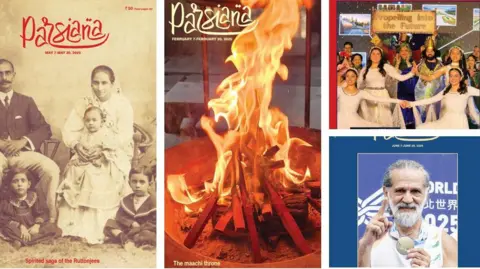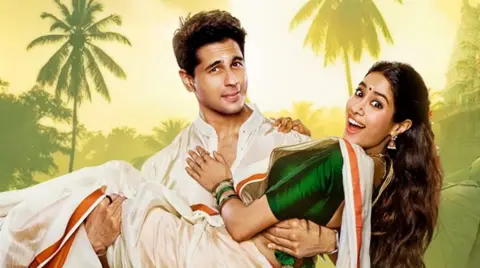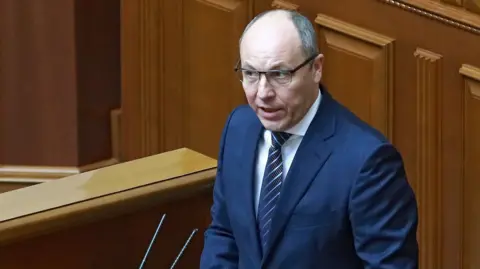Bollywood star Dharmendra has died in the Indian city of Mumbai at the age of 89.
Indian Prime Minister Narendra Modi paid tribute to the actor, saying his passing marks the end of an era in Indian cinema.
Dharmendra, who often described himself as a simple man, commanded extraordinary affection and loyalty from his tens of millions of fans.
Best known as Veeru, the lovable petty criminal in the 1975 blockbuster Sholay, he appeared in over 300 films, many hits, captivating audiences for decades.
Songs featuring him topped the charts, and his romance and marriage with Hema Malini made headlines.
Dubbed the 'original He-Man of Bollywood' and 'Garam (hot) Dharam', the actor often made it to global lists of 'most handsome men' in his heyday and female fans were known to sleep with his photographs under their pillows.
Bollywood stars weren't immune to his charms either - over the years actress Madhuri Dixit described him as 'one of the most handsome people I have seen on screen', superstar Salman Khan said Dharmendra was the 'most beautiful looking man' and actress Jaya Bachchan called him 'a Greek God'.
Dharmendra always said he was embarrassed by talk of his good looks and attributed it to nature, my parents and my genes.
Born on 8 December 1935 in Nasrali village in Punjab's Ludhiana district in a middle-class Jatt-Sikh family, he was named Dharam Singh Deol by his schoolteacher father.
In a 2018 interview with BBC Hindi, he said his father wanted him to study, but he fell in love with films early on and wanted to be a hero.
I watched my first film when I was in the ninth standard and I was hooked. I was wondering, where is this heaven where all these beautiful people live? I thought I must find my way there. I felt like they were mine and I belonged to them.
But when he told his family, they were appalled.
My mother said, 'you are our eldest child, you have family responsibilities'. I was very sad. So when we heard about the All India Talent Contest by Filmfare magazine, to humour me, she said, 'ok, send in your application'. We didn't think I would be selected.
But then he won the contest and moved to Bombay (now Mumbai) and the rest, as they say, is history.
For three decades - after debuting with Dil Bhi Tera, Hum Bhi Tere (The heart is yours and so am I) in 1960 - he ruled Bollywood, delivering several hits a year.
Dharmendra first rose to fame with Bimal Roy's 1963 film Bandini, earning praise for his elegant portrayal of a prison doctor who falls for a convict.
He soon became a romantic hero, pairing successfully with top actresses like Nutan, Meena Kumari, Mala Sinha, and Saira Banu.
In 1966, he did his first action role in Phool Aur Patthar (Flower and rock), but it was the 1971 hit Mera Gaon Mera Desh (My village, my country) which cemented his reputation as an action hero.
Tall and well-built, Dharmendra often did his own action scenes, involving daring stunts, even taking risks.
Besides romance and action, the actor also delivered hits that were suspense thrillers and comedies. Critics praised him for his impeccable comic timing in the 1975 laugh riot Chupke Chupke.
Over the years, Dharmendra said he was cast against 70 heroines, but his most successful screen pairing was with Hema Malini, who later became his second wife.
The couple first met at a film premiere in 1965 and Malini made an immediate impression on Dharmendra. In her 2017 biography, she wrote that she heard Dharmendra telling fellow actor Shashi Kapoor in Punjabi, Kudi badi changi hai (The girl is quite pretty).
Their romance bloomed in the 1970s through superhit films like Seeta Aur Geeta, Raja Jani, and Sholay, making headlines as Dharmendra was already married with grown-up children with his first wife, Prakash Kaur.
The media wrote about the resistance from Malini's family to their wedding, but the couple finally tied the knot in 1980. Some reports said they had converted to Islam, which allows polygamy, to marry - a claim Dharmendra later denied.
The actor-producer also dabbled in politics. He was the BJP MP from Bikaner in Rajasthan for one term from 2005 to 2009. But he was criticised for not taking politics seriously as he rarely attended parliament, preferring to spend time shooting for films or working on his farm.
In his lifetime, the actor gave many fine performances, but if there's one role that he'll always be remembered for, it'll be that of Veeru in Sholay - the 1975 blockbuster that has become a cultural phenomenon.
The film became a cult classic and many fans credited Dharmendra for its success, describing him as the soul of Sholay. The actor also described it as his finest role.
Despite delivering dozens of hits, Dharmendra never made it to the number one slot in Bollywood - losing to contemporaries such as Dilip Kumar, Rajesh Khanna and Amitabh Bachchan - and was passed for the prestigious Filmfare awards several times.
It was finally in 1997 that Filmfare honoured him with the Lifetime Achievement Award for his contribution to Hindi cinema and in 2012, he was conferred the Padma Bhushan - an Indian government honour given to civilians for distinguished service.
Dharmendra wore his stardom lightly, staying away from the rat race and said he never wanted to be number one in the industry.
I never asked for too much money, and fame is transient. All I ever wanted was people's love, he told an interviewer.
I came here just for this love. Everyone loves Dharmendra and I am grateful for that, he added.





















